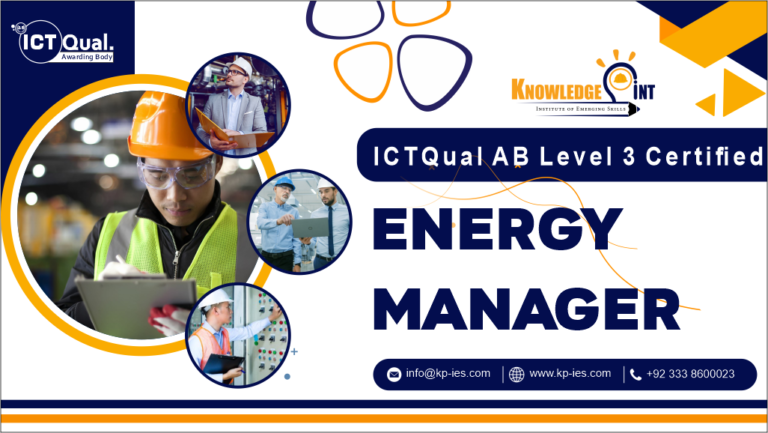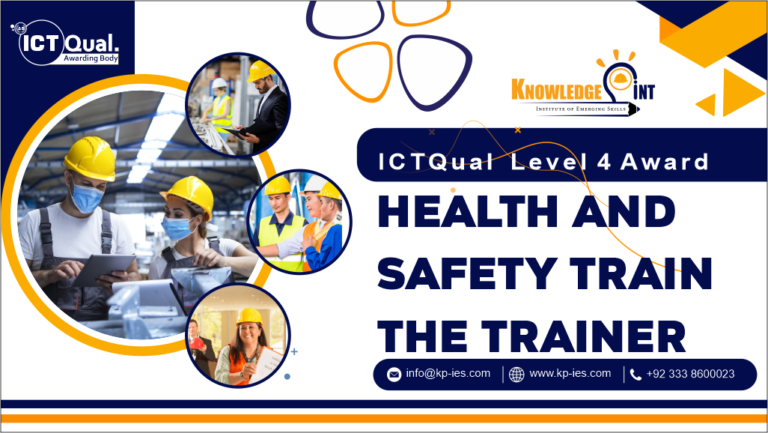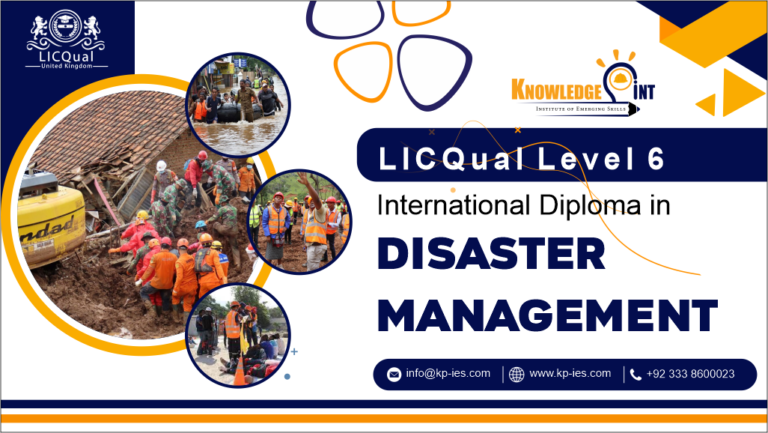In the construction and building industry, safety is paramount. One critical area of safety is scaffolding, which plays a crucial role in supporting workers and materials during construction projects. The ICTQual Level 1 Award in Scaffolding Safety is designed to provide essential knowledge and skills to ensure that scaffolding is erected, maintained, and dismantled safely and effectively. This qualification is a valuable step for anyone involved in scaffolding or working in environments where scaffolding is used.
The ICTQual Level 1 Award in Scaffolding Safety is a foundational qualification aimed at individuals who are new to scaffolding or those seeking to formalize their understanding of scaffolding safety practices. This award covers basic principles and practices necessary to maintain safety and compliance in scaffolding operations.
The ICTQual Level 1 Award in Scaffolding Safety is an essential qualification for anyone involved in the scaffolding sector or working in environments where scaffolding is used. It provides a solid foundation in safety practices, risk management, and compliance, ensuring that scaffolding operations are conducted safely and effectively. By investing in this qualification, individuals not only enhance their career prospects but also contribute to a safer and more efficient construction industry.
Course Overview
The ICTQual Level 1 Award in Scaffolding Safety consists of 6 mandatory units which are as follows.
The future progression of the ICTQual Level 1 Award in Scaffolding Safety can lead learners towards several pathways, depending on their career goals and aspirations in the field of law and related sectors. Here are some potential avenues of progression:
1. Introduction to Scaffolding Safety
- Fundamental Concepts:
- Understand the basic principles and importance of scaffolding safety within the construction industry.
- Recognize the role of scaffolding in supporting construction activities and the potential risks associated with it.
- Basic Scaffolding Types:
- Identify different types of scaffolding systems, including their uses and applications in various construction scenarios.
2. Legislation and Standards
- Regulatory Framework:
- Gain knowledge of the key legislation, regulations, and standards that govern scaffolding safety.
- Understand the legal requirements and responsibilities related to scaffolding safety in your jurisdiction.
- Compliance:
- Learn how to ensure scaffolding practices comply with relevant safety regulations and industry standards.
3. Scaffold Components and Structures
- Component Identification:
- Recognize and name the main components of scaffolding systems, including standards, ledgers, transoms, and base plates.
- Understand the function of each component within the scaffolding structure.
- Structural Understanding:
- Comprehend how different scaffold components fit together to form stable and secure structures.
- Learn the basic principles of scaffolding assembly and disassembly.
4. Inspection Procedures
- Inspection Techniques:
- Develop skills in conducting thorough inspections of scaffolding systems to ensure their safety and integrity.
- Learn to identify common issues and defects in scaffolding components and structures.
- Record Keeping:
- Understand the importance of maintaining accurate records of scaffolding inspections and any remedial actions taken.
- Learn to use inspection checklists and documentation to track and report findings.
5. Hazard Identification and Control
- Hazard Recognition:
- Identify potential hazards associated with scaffolding, including structural, environmental, and operational risks.
- Understand common hazards such as unstable ground, overloading, and falling materials.
- Control Measures:
- Learn to implement appropriate control measures to mitigate identified hazards and prevent accidents.
- Develop strategies for ensuring a safe working environment by addressing and managing risks effectively.
6. Emergency Response and First Aid
- Emergency Procedures:
- Understand the procedures for responding to emergencies involving scaffolding, including evacuation plans and emergency contact protocols.
- Learn how to handle incidents such as falls, collapses, or equipment failures.
- First Aid:
- Gain basic first aid skills relevant to scaffolding-related injuries, including treating cuts, bruises, and fractures.
- Understand the importance of providing prompt and effective first aid while awaiting professional medical assistance.
The learning outcomes for the ICTQual Level 1 Award in Scaffolding Safety ensure that individuals acquire essential knowledge and skills to work safely with scaffolding systems. By understanding scaffolding safety principles, legislation, component identification, inspection procedures, hazard control, and emergency response, participants are well-prepared to contribute to a safer construction environment. This foundational knowledge is crucial for minimizing risks and ensuring the safety and effectiveness of scaffolding operations.
Course Benefits of the ICTQual Level 1 Award in Scaffolding Safety :
1. Specialized Expertise
- Auditing Proficiency: Gain specialized knowledge and skills in auditing energy management systems according to the ISO 50001:2018 standard.
- Industry Recognition: Earn a globally recognized qualification that demonstrates your proficiency as an energy management systems auditor.
2. Career Advancement
- Expanded Career Opportunities: Qualify for roles such as Lead Energy Auditor, Energy Management Consultant, or Compliance Officer.
- Higher Earning Potential: Enhance your value to employers and increase your earning potential with specialized expertise in energy management auditing.
3. Industry-Relevant Skills
- Practical Application: Acquire practical skills and techniques for planning, conducting, and documenting energy management system audits.
- Effective Communication: Develop communication skills to interact with auditees, audit teams, and stakeholders effectively.
4. Contribution to Sustainability
- Promotion of Energy Efficiency: Play a key role in promoting energy efficiency and reducing environmental impact within organizations.
- Support for Sustainable Practices: Assist organizations in implementing and maintaining energy management systems that support sustainability goals.
5. Quality Assurance
- Compliance Assurance: Help organizations achieve compliance with ISO 50001:2018 requirements and other relevant regulatory standards.
- Risk Mitigation: Identify areas of non-conformance and provide recommendations for corrective actions to mitigate risks.
6. Continuous Professional Development
- Lifelong Learning: Engage in continuous professional development by staying updated with the latest developments and trends in energy management auditing.
- Networking Opportunities: Connect with industry professionals, auditors, and experts, expanding your professional network and opportunities.
7. Organizational Benefits
- Improved Performance: Contribute to the improvement of organizational energy performance through effective auditing and recommendations for continuous improvement.
- Enhanced Reputation: Help organizations build a positive reputation for their commitment to energy management and sustainability practices.
8. Personal Growth
- Leadership Development: Develop leadership skills to effectively manage audit teams, delegate tasks, and ensure audit objectives are met.
- Confidence Boost: Gain confidence in your abilities as an energy management systems auditor through practical training and hands-on experience.
Completing the ICTQual Level 1 Award in Scaffolding Safety provides a strong foundation in scaffolding safety practices and opens up various pathways for further development and career advancement. Here are potential future progression routes for individuals who have completed this qualification:
1. Advanced Scaffolding Qualifications
- ICTQual Level 2 Award in Scaffolding Safety:
- Build on your foundational knowledge with more advanced concepts and practices in scaffolding safety. This qualification offers deeper insights into scaffolding techniques, safety management, and more complex structures.
- ICTQual Level 3 Award in Scaffolding Safety:
- Pursue the Level 3 Award to gain specialized knowledge and skills for supervising and managing scaffolding operations. This level focuses on advanced safety practices, risk management, and leading scaffolding teams.
2. Specialized Training and Certifications
- Specialized Scaffolding Courses:
- Engage in training programs focused on specific types of scaffolding systems, such as suspended scaffolding, mobile scaffolding, or complex access structures. These courses offer specialized skills and knowledge for working with various scaffolding types.
- Advanced Safety Certifications:
- Obtain certifications in advanced safety practices, such as NEBOSH (National Examination Board in Occupational Safety and Health) or IOSH (Institution of Occupational Safety and Health) qualifications, to enhance your expertise in health and safety management.
3. Career Advancement Opportunities
- Scaffolding Supervisor or Manager:
- Move into supervisory or management roles where you will be responsible for overseeing scaffolding projects, ensuring safety compliance, and managing teams of scaffolders.
- Safety Advisor or Coordinator:
- Transition into roles focused on safety and compliance within construction projects. As a safety advisor or coordinator, you will develop and implement safety policies and procedures, including scaffolding safety.
- Construction Site Manager:
- Use your scaffolding safety expertise to advance into broader construction management roles, overseeing various aspects of construction projects, including safety, logistics, and quality control.
4. Further Academic and Professional Development
- Diplomas and Degrees:
- Pursue higher-level qualifications in construction management, occupational health and safety, or engineering to broaden your career options and enhance your professional skills.
- Professional Memberships:
- Join professional bodies such as the Chartered Institute of Building (CIOB) or the Royal Institution of Chartered Surveyors (RICS) to access additional resources, networking opportunities, and professional development.
5. Consultancy and Advisory Roles
- Independent Consultant:
- Offer consultancy services to construction firms, providing expertise on scaffolding safety practices, compliance with regulations, and risk management strategies.
- Training Provider:
- Become a trainer or educator, delivering courses and workshops on scaffolding safety to other professionals in the industry, helping to raise safety standards across the sector.
The ICTQual Level 1 Award in Scaffolding Safety lays a solid groundwork for those seeking to advance their careers in scaffolding and construction safety. By pursuing higher-level qualifications, specialized training, and professional development opportunities, individuals can build on their initial qualification to take on more complex roles and responsibilities. Whether aiming for advanced scaffolding roles, broader safety management positions, or consultancy and training opportunities, the Level 1 Award provides a crucial starting point for a successful and fulfilling career in scaffolding safety.







